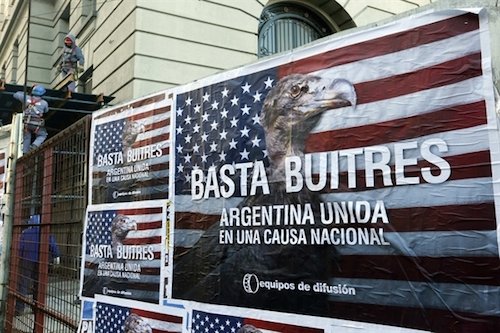
Ratings agency S & P declared Argentina in default after the government missed a deadline for paying interest on $13 billion of restructured bonds.
Argentina has defaulted on its debt for the second time in 13 years after last-minute talks in New York with a group of bond-holders ended in failure.
So-called “vulture fund” investors were demanding a full pay-out of $1.3 billion on bonds they hold.
Argentina has said it cannot afford to do so, and has accused them of using its debt problems to make a big profit.
A US judge had set a deadline of 04:00 GMT on Thursday for a deal. The crisis stems from Argentina’s 2001 default.
Late on Wednesday evening, Argentina’s Economy Minister Axel Kicillof said the investors had rejected the government’s latest offer.

“Unfortunately, no agreement was reached and the Republic of Argentina will imminently be in default,” Daniel Pollack, the court-appointed mediator in the case, said in a statement on Wednesday evening.
The fresh default is not expected to affect Argentina’s economy in the same way it did in 2001, when dozens were killed in street protests and the authorities froze savers’ accounts to halt a run on the banks.
“The full consequences of default are not predictable, but they certainly are not positive,” Daniel Pollack said.
Speaking at a news conference in New York, Axel Kicillof said Argentina would not do anything illegal.
The investors, also known as “hold-outs”, are US hedge funds that bought debt cheaply after Argentina’s economic crisis.
They never agreed to the restructuring accepted by the majority of bond-holders.
President Cristina Fernandez de Kirchner has described as vultures the minority bond-holders – including Aurelius Capital Management and NML Capital.
She accuses them of taking advantage of Argentina’s debt problems to make large profits.
S&P noted that it could revise the rating if Argentina were to find some way to make the payments.
The hedge funds are demanding Argentina make interest payments on debt which it defaulted on in 2001, even though it was bought at less than face value.
The US courts have blocked payments to other bondholders who agreed a separate deal with Argentina, until agreement with the “hold-outs” is reached.
Axel Kicillof said he planned to return to Argentina after the news conference, saying the country would do what is needed to deal with what he called an unfair situation.
[youtube ddIV1MbAIUY 650]
[youtube iGED4Z6TrtY 650]
CONCLUSION :- ” Downward trend in world
economy is likely to be in mild form during
November, 2014 to April, 2015, to grow somewhat intense during
May, 2015
to October, 2015, becomes harsh during November, 2015 to July, 2016.
Such areas of life as minerals and metals, foodcrops, energy
resources , defence and security of nations are likely to bear the brunt of
these trends.
Collective wisdom in decision making, communication systems, aviation
industry, and the cinema , music and TV industries are also , in
addition, likely to be touched by these trends.
Countries or regions whose names begin with the letters B , E ,
EU, N, O, P, U or V may need to implement multilevel approach to
challenges during this period”.
This is the substance or salient feature of my article – ”
Stressful times ahead for world economy in 2015 and 2016″ published online on June 2, this year with astrologyweekly.